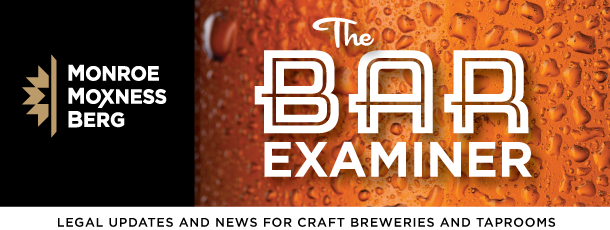DOWNLOAD THE FULL SUMMER 2015 ISSUE OF BAR EXAMINER
Earlier this year, Governor Mark Dayton signed a bill into law allowing for Sunday growler sales. Now, under Minnesota Statute 340A.301, subdivision 7(b), brewers that possess the requisite authorization (namely, on-and-off-sale licenses) can distribute 64-ounce jugs of intoxicating liquor to go, seven days a week.
But there’s a catch: “Sunday sales must be approved by the licensing jurisdiction.” This means that Minnesota’s new Sunday growler legislation needs to be adopted on a city-by-city basis. Luckily for brewers and consumers alike, around twenty Minnesota cities and towns – including Minneapolis, St. Paul, Duluth, and Stillwater – have already passed ordinances adopting Sunday growler sales.
If your brewery is currently operating in a municipality that has not adopted subdivision 7(b), you may consider approaching your city council – or a city councilperson, individually – to propose adoption of such an ordinance. This process will be greatly facilitated if your suggestion is accompanied by a clean, well-drafted sample ordinance. Below are two examples taken from Minnesota cities that have already adopted Sunday growler ordinances. These cities have incorporated the Sunday-sale provision (in italics) directly into their preexisting brewery ordinances.
EXAMPLE A:
“Off-sale” malt liquor. (a) A brewer licensed under Minnesota Statute 340A.301 may be licensed for the “off-sale” of malt liquor produced and packaged on the licensed premises subject to the following conditions:
- off-sale of malt liquor may only be made during the hours that “offsale” of liquor may be made in [the City’s code], and from 8:00 AM to 10:00 PM on Sundays, excluding Thanksgiving Day, December 25th, and after 8:00 PM on December 24th.
- The malt liquor shall be packaged in sixty-four-ounce containers commonly known as “growlers” or in seven hundred fifty (750) milliliter bottles;
- The malt liquor sold at “off-sale” must be removed from the licensed premise before the applicable closing time at exclusive liquor stores;
- The “growler” must be sealed in such a manner that the seal must be broken in order to open the container and the seal must bear the name and address of the brewer, and the legend “Not for Consumption in Public” must be prominently displayed on the seal.
(b) “Off-sale” malt liquor premises shall not be subject to the requirement that they be in excess of two thousand (2,000) feet from another “off-sale” liquor premise.
(c) The annual license fee shall be as listed in the License Fee Schedule.
EXAMPLE B:
[…]
(c) Except as provided herein, off-sale licenses authorize the licensee to sell intoxicating liquor at retail in original packages only for consumption off the licensed premises. The following additional requirements apply to specific types of off sale licenses:
- Brewery malt liquor licenses permit breweries holding on-sale licenses, or breweries that manufacture fewer than 3,500 barrels of malt liquor in a year, to sell malt liquor off sale in 64-ounce containers commonly known as growlers, subject to the restrictions in Minnesota Statutes, Section 340A.301, subd. 7(b), or its successor, and this Chapter. Sale of malt liquor off sale in 64-ounce containers, commonly known as growlers, may be conducted on Sundays. All Sunday sales are subject to the limitation on hours of sale provided in [another portion of the City’s code.]
Note that while these two examples look rather different, both have correctly accounted for three important characteristics:
- express incorporation of Minnesota Statute 340A.301;
- allowing for Sunday growler sales; and
- establishing permissible hours for Sunday sales within the city.
As long as these three aspects are addressed, an ordinance will be sufficient for establishing Sunday growler sales. Even breweries operating in cities that have adopted such an ordinance should double-check their municipality’s language – to ensure, for instance, that their city does not require additional licensing or fees prior to Sunday growler sales.
While this new legislation does provide obvious benefits to eligible breweries – increased sales, exposure to new patrons, and a monopoly on Sunday sales in the state – many view this breakthrough as a smaller step towards a broader repeal of the Sunday sales ban. Whichever way you look at it, this is a nice hop forward for Minnesota’s craft breweries and their rapidly growing customer base.
By Blake DeRosier, Monroe Moxness Berg

